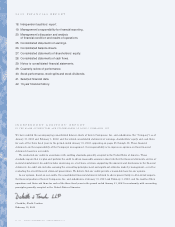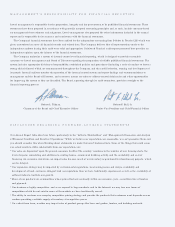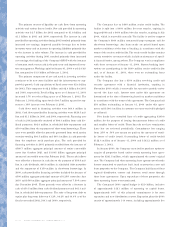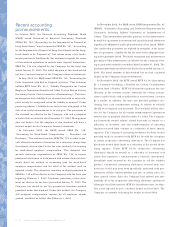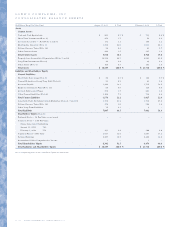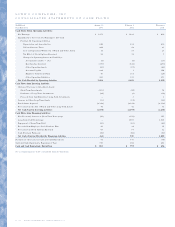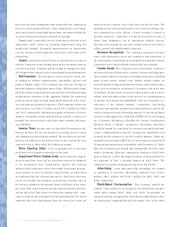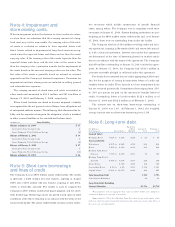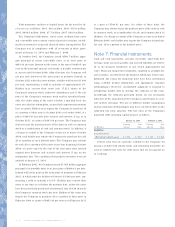Lowe's 2002 Annual Report Download - page 26
Download and view the complete annual report
Please find page 26 of the 2002 Lowe's annual report below. You can navigate through the pages in the report by either clicking on the pages listed below, or by using the keyword search tool below to find specific information within the annual report.
24 / 25 LO WE’S CO MPANIES, INC. ANNUAL REPORT 2002
Recent accounting
pronouncements.
In October 2001, the Financial Accounting Standards Board
(FASB) issued Statement of Financial Accounting Standards
(SFAS) No. 144, “Accounting for the Impairment or Disposal of
Long-Lived Assets,” which supersedes SFAS No. 121, “Accounting
for the Impairment or Disposal of Long-Lived Assets and for Long-
Lived Assets to be Disposed of,” but retains many of its funda-
mental provisions. Additionally, this statement expands the scope
of discontinued operations to include more disposal transactions.
SFAS No. 144 was adopted by the Company for the fiscal year
ended January 31, 2003. The initial adoption of this standard did
not have a material impact on the Company’s financial statements.
In June 2002, the FASB issued SFAS No. 146, “Accounting for
Costs Associated with Exit or Disposal Activities.” This statement
nullifies EITF Issue No. 94-3, “Liability Recognition for Certain
Employee Termination Benefits and Other Costs to Exit an Activity
(Including Certain Costs Incurred in a Restructuring).” This state-
ment requires that a liability for costs associated with an exit or dis-
posal activity be recognized when the liability is incurred. Under
previous guidance, a liability for an exit cost was recognized at the
date of an entity’s commitment to an exit plan. The provisions of
this standard are effective for the Company with exit or disposal
activities that are initiated after December 31, 2002. Management
does not believe that the adoption of this standard will have a
material impact on the Company’s financial statements.
In December 2002, the FASB issued SFAS No. 148,
“Accounting for Stock-Based Compensation — Transition and
Disclosure.” This statement amends SFAS No. 123 in order to pro-
vide alternative methods of transition for a voluntary change from
the intrinsic value method to the fair value method of accounting
for stock-based employee compensation. This statement also
amends disclosure requirements of SFAS No. 123 to require
prominent disclosures in both annual and interim financial state-
ments about the method of accounting used for stock-based
employee compensation and the effect of the method used on
reported results. The alternative transition methods permitted in
SFAS No. 148 will be effective for the Company with the fiscal year
beginning February 1, 2003. Disclosure provisions of this state-
ment are effective for the fiscal year ended January 31, 2003. The
Company has elected to use the prospective transition method
permitted under this standard. Under this method, the Company
will recognize compensation expense for all employee awards
granted, modified, or settled after February 1, 2003.
In November 2002, the FASB issued FASB Interpretation No. 45
(FIN45), “Guarantor’s Accounting and Disclosure Requirements for
Guarantees, Including Indirect Guarantees of Indebtedness of
Others.” This interpretation provides guidance on the disclosures to
be made by a guarantor in its interim and annual financial statements
regarding its obligations under guarantees that it has issued. FIN45
also clarifies that guarantors are required to recognize, at the incep-
tion of a guarantee, a liability for the fair value of the obligation relat-
ing to the guarantee issued. The initial recognition and measurement
provisions of this interpretation are effective for the Company relat-
ing to guarantees entered or modified after December 31, 2002. The
disclosure provisions are effective for the fiscal year ended January 31,
2003. The initial adoption of this standard has not had a material
impact on the Company’s financial statements.
In November 2002, the EITF issued EITF 02-16 “Accounting
by a Customer (Including a Reseller) for Certain Consideration
Received from a Vendor.” EITF 02-16 provides guidance for clas-
sification in the reseller’s income statement for various circum-
stances under which cash consideration is received from a vendor
by a reseller. In addition, the issue also provides guidance con-
cerning how cash consideration relating to rebates or refunds
should be recognized and measured. This standard will be effec-
tive for the Company for all vendor reimbursement agreements
entered into or modified after December 31, 2002. The Company
has historically treated volume related discounts or rebates as a
reduction of inventory cost and reimbursements of operating
expenses received from vendors as a reduction of those specific
expenses. The Company’s accounting treatment for these vendor
provided funds is consistent with EITF 02-16 with the exception
of certain cooperative advertising allowances. The Company has
previously treated these funds as a reduction of the overall adver-
tising expense. Under EITF 02-16 cooperative advertising
allowances should be treated as a reduction of inventory cost
unless they represent a reimbursement of specific, incremental,
identifiable costs incurred by the customer to sell the vendor’s
product. Cooperative advertising allowances received from ven-
dors have in the past been both specifically associated with pro-
motions to sell the vendor’s product and also, in certain cases, of a
more general nature. Since the Company had entered into sub-
stantially all of the cooperative advertising allowance agreements
relating to fiscal 2003 prior to EITF 02-16’s effective date, its adop-
tion is not expected to have a material impact on fiscal 2003. The
Company is currently evaluating the impact on fiscal 2004.






